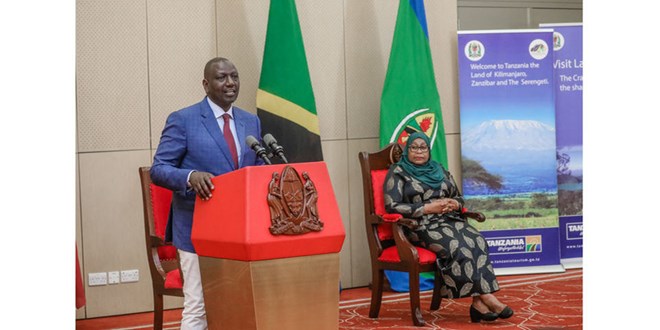
By Zephania Ubwani
Monday March 20, 2023

Kenyan President William Ruto speaks at State House in Dar es Salaam on October 11, 2022, in the presence of his host, President Samia Suluhu Hassan. PHOTO | STATE HOUSE
Arusha. Kenyan President William Ruto has joined the fray for a comprehensive review of the East African Community (EAC) Treaty, in support of an earlier call by President Samia Suluhu Hassan that the Treaty did not reflect the current times.
Dr Ruto, speaking in Nairobi on Friday, said the current treaty came into effect when the bloc had only three members: Tanzania, Uganda and Kenya.
The proposed new treaty, he said, should be aligned with the current structure of the EAC, which is made up of seven partner states.
“The treaty should indeed be amended to accommodate all the partner states considering that they all have different cultures,” he added.
Dr Ruto made the call during his meeting with the Speaker of the East African Legislative Assembly (EALA), Joseph Ntakirutimana, at State House.
Mr Ntakirutimana echoed, citing the use of French and Kiswahili as additional official languages of the EAC as having spurred the need for the Treaty review.
The Speaker, a lawmaker from Burundi, decried the use of only English as the official language of the community, which currently has seven member states.
He describes this as an impediment to seamless communication in the Assembly, now that it has members from the DR Congo, which is a French-speaking country.
The EAC Treaty, a 116-page document unveiled on November 30th, 1999, specifies English as the official language and Kiswahili as a lingua franca, a community-wide language.
The treaty also names Tanzania, Uganda and Kenya as partner states, noting, however, that any other country can be granted membership.
Membership grew from three founders to five in 2007 when Burundi and Rwanda joined, followed by South Sudan and the DR Congo in 2016 and 2022, respectively.
Failure to amend the treaty despite repeated calls made countless times has significantly impacted the operations of Eala and the East African Court of Justice (EACJ).
The two organs of the community have been struggling for financial and administrative autonomy from the secretariat to enable them to run their affairs effectively.
There had been repeated calls to amend the EAC Treaty from the political leaders, legislators, and business captains in the region.
During her meeting with senior executives of the community led by secretary general Peter Mathuki in Dar es Salaam in July 2021, President Hassan stressed the same.
“The treaty establishing the EAC was put on paper 20 years ago when we were only three members,” she said in 2021, when members had grown to six.
“Hopefully we shall continue growing. We therefore need to review not only the treaty but also other instruments to align them with the current times,” she pointed out.
Currently, the EAC has seven member countries after the admission of the DR Congo in April last year amid efforts to pull Somalia into the bloc.
Voices have also been raised by Eala members as well as the consultants on the fast expansion of the bloc on whether it would yield the anticipated results.
At a recent session of the regional assembly in Arusha, there were calls for more elaborate plans before the admission of new members.
It was argued that the EAC in operation today was modeled on the topology of three original states: Tanzania, Uganda and Kenya. “There was no critical planning for expansion,” said Mr Kenneth Bagamuhunda, a Kampala-based consultant and the former EAC director general of Customs and Trade.
He told a special sitting of the Assembly that there should be no rush for admitting new members so that countries that have met the laid-down benchmarks can join the bloc. Mr Bagamuhunda, who retired last year after serving the EAC in a senior position for 18 years, argued that there should be a clear mechanism for expansion.
A verification mission has been sent to Somalia to assess the country’s readiness.
But Mr Bagamuhunda said that as long as the EAC Treaty has room for admission of new countries, the process should be orderly.
“There should be no rush so as to allow for a grace period to enable the prospective member to understand the nitty-gritty of the EAC.”
He said it took Burundi and Rwanda nearly 10 years to join the bloc after participating in EAC programmes as observers.
The two countries joined the EAC in July 2007, with Rwanda having applied for membership in 1996 and Burundi in 1999.
Much as he welcomed the admission of new members, the former top EAC executive stressed the need for detailed negotiations before a new member is admitted.
The level of negotiations from the verification stage should be detailed and deepened “so as to have countries that would easily comply with the EAC set of things,” he added.